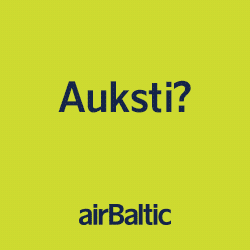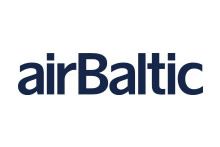Author: Janis Vanags
Source: Air Baltic Corporation
Latvian national airline airBaltic is set to further fleet modernisation and plans to retire its Fokker 50 aircraft in the winter season, to improve the efficiency of the airline and maintain its focus on affordable ticket prices for flights to/from Europe, Middle East, and Russia/CIS.
Bertolt Flick, President and CEO of airBaltic: “In the past twelve years, Fokker 50 has served airBaltic very well. It has been our main workhorse for regional flights that today bring transit passengers to North Hub Riga for their onward journeys to destinations like Paris, London, Tel Aviv, or Kiev.
It is an excellent aircraft. However, the new reality of increasing fuel prices, mounting cost pressures, coupled with volatility of the markets in Europe and unrest in the Middle East, require us to further improve the efficiency of the airline. As part of airBaltic’s fleet modernisation plan, we introduced the state-of-the-art Bombardier Q400 Next Gen aircraft last year. We clearly see the impact of the introduction of the modern aircraft on the efficiency of the airline and operating costs helping us to maintain affordable ticket prices in the world of rising fuel costs. Furthermore, the maintenance costs for the Fokker 50 are also growing, as it is an out-of-production aircraft. We will now focus on reshaping our business and retire Fokker 50 aircraft in the winter season.
As part of this move, airBaltic will optimise its network for the winter, to better reflect the market demand. airBaltic will also evaluate an option to introduce additional modern turboprop aircraft for the summer of 2012.
The retirement of Fokker 50 comes earlier than originally scheduled for 2013, to speed up the fleet modernisation process. Overall, the retirement of Fokker 50s will be a substantial cost reduction for airBaltic, and will bring us closer to the goal of operating two aircraft types.”
airBaltic introduced Fokker 50s in 1998. In the past twelve years the aircraft have completed over 140 thousand flights and spent 180 thousand hours in the air, serving 3.6 million passengers. The total distance covered by airBaltic Fokker 50s in the past twelve years is 72 million kilometres.
airBaltic serves over 80 destinations from its home base in Riga, Latvia. From every one of these, airBaltic offers convenient connections via North Hub Riga to its network spanning Europe, Scandinavia, Russia, CIS and the Middle East.
airBalticin brief:
AIR BALTIC CORPORATION (airBaltic) is a joint stock company that was established in 1995. The primary shareholders are the Latvian state, with 52.6% of stock, and SIA Baltijas aviācijas sistēmas, with 47.2% of stock. The airBaltic fleet consists of 34 aircraft – six Boeing 737-500, eight Boeing 737-300, two Boeing 757-200, ten Fokker 50 airplanes and eight Bombardier Q400Next Gen. airBaltic offers nonstop flights from three Baltic capital cities – Riga, Vilnius, and Tallinn. airBaltic received the title of Airline of the Year 2009/2010 (Gold Award) from the European Regions Airline Association. airBaltic is the winner of Air Transport World Phoenix Award 2010 – a global recognition of excellence in restructuring business. In summer 2010, airBaltic was chosen for anna.aero ANNIES Award as Europe's largest flag carrier by new routes. airBaltic won a special Pacesetter Award 2010 from the Jury of the Budgies World Low Cost Airline Awards, recognising achievements of airBaltic as a hybrid airline.
To publish this article please contact BalticTravelnews.eu editorial board






